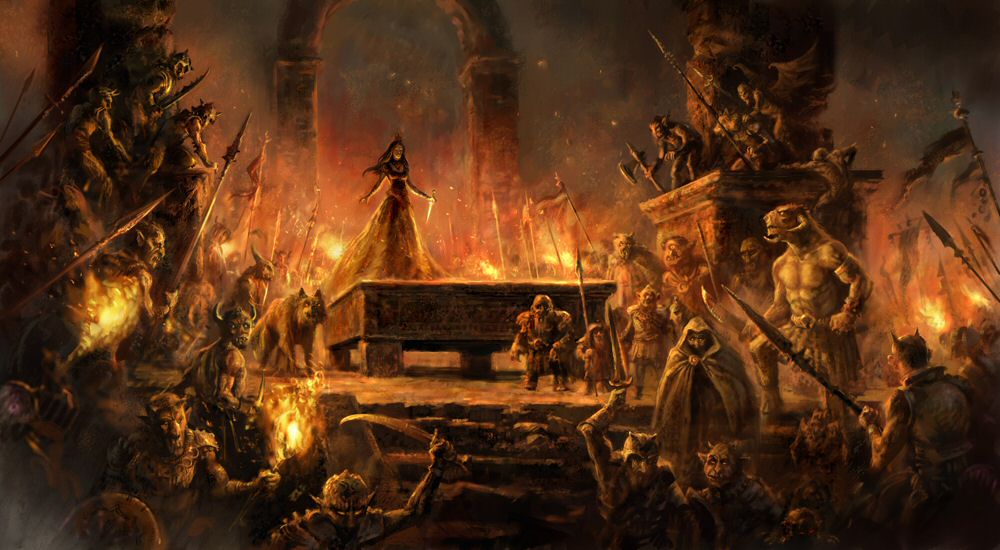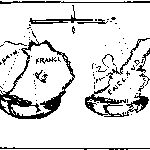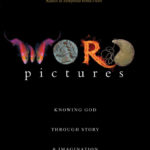Speculative Faith Reading Group 8: The Stone Table
This morning I realized: oh, great, I will be struggling during this Saturday’s LWW reading group at my church. Why? Because our two-chapter reading will end with Aslan’s death.
 Embarrassing? Perhaps. Yet I’ve come to view emotional responses to the death of a story’s hero, particularly such a strong Christ-like hero as the Lion of Narnia, as acts of worship.
Embarrassing? Perhaps. Yet I’ve come to view emotional responses to the death of a story’s hero, particularly such a strong Christ-like hero as the Lion of Narnia, as acts of worship.
Have you ever been singing in church and suddenly become self-aware? You think: I like this song, I enjoy these people, I love the preaching, and I really should be more emotional in my singing to God, but I’m not. To me this happens more often than I’d like to admit. And one solution is this: thanks to Christ’s righteousness, I am overcome as a rightful response to His truth and sacrifice, maybe not during every church song, but by stories like this one.
How has Aslan’s death affected you, and how does it affect you now? (We will get to his resurrection and the story’s eucatastrophe next week, in the final installment of this LWW reading-group series.) How do other heroes’ deaths remind you of Christ’s ultimate death?
Chapter 13: Deep Magic from the Dawn of Time
- The Witch says: “[Aslan] may not stay long. And then—we would fall upon the three [children] at Cair.” (page 135) After we’ve read of the Witch’s terror at Aslan’s arrival, do you think she truly believes Aslan will simply leave Narnia back in her hands?
- “I would like to have done it on the Stone Table itself,” said the Witch. “That is the proper place. That is where it has always been done before.” (page 135) By now, what is she planning? How does this fit with our first glimpse of the Stone Table? (Do you recall the last chapter’s description of its ancient appearance and mysterious carven symbols?)
- What ideas do you get about the Stone Table and its history and purpose? How is this way of discussing it better than saying something like, Now you see, the Stone Table had long ago been used for sacrifices, or whatever purpose you think it had in the past?
- Quick silly question: Does anyone remember, in the BBC LWW film, the Witch saying “You!” to the Wolf, who (in dog form) looks up and immediately begins dog-smiling?
- Now we hear the Witch describe the bad creatures. Among these, which seems scariest?
- How do you feel, with Edmund, to hear the “whizz—whizz—whizz” knife-sharpening sound? Does the good creatures’ arrival seem expected or surprising?
 At last Edmund is forgiven, after a conversation with Aslan to which we are not privy. What do you think Aslan said to him? Why does the author not show that conversation? And why do you think Aslan says “there is no need to talk to him about what is past” (page 139)? Who was Edmund’s worst sin against — his brother and sisters, or Aslan?
At last Edmund is forgiven, after a conversation with Aslan to which we are not privy. What do you think Aslan said to him? Why does the author not show that conversation? And why do you think Aslan says “there is no need to talk to him about what is past” (page 139)? Who was Edmund’s worst sin against — his brother and sisters, or Aslan?- Now we immediately learn something new: Edmund has met Aslan and repented, but consequences remain. Edmund must be killed for his treason. Do you see the story progression: events go from bad, to good, to bad, to worse, to good, to even worse?
- Mr. Beaver refers to the Witch as the “Emperor’s hangman” (page 142). Is this accurate? What about in our world — does God have a “hangman” or does He punish sin Himself?
- Look up Hebrews 9:22. Then Romans 3:21-26. In our world, Who requires the shedding of blood as payment for sin? Now consider the Witch’s words, which Aslan does not deny: “… That human creature is mine. His life is forfeit to me. His blood is my property.” (page 142) How is this different from how and why Jesus died for people in our world?
- “Work against the Emperor’s Magic?” said Aslan … (page 142). Is Aslan “limited” by this Deep Magic? Even if he is not, how does this all-powerful Lion come across in this?
- When the Witch questions Aslan, how do you like his reaction? What kind of reminder does this serve, even after all the worrying and uncertainty about the Witch’s claim?
Chapter 14: The Triumph of the Witch
- As the camp is moving, Aslan is unusually sad and distracted. He seems more “mortal” (or “human”) than we ever see him again in the stories. How does this strike you, when compared with Christ’s response to his forthcoming suffering? Can Christ be affected by emotions outside Himself? Is He vulnerable to them? What about God the Father?
- Returned to the Stone Table, we find the hordes of evil creatures, many of which the Witch had mentioned earlier. Lewis names some and leaves others unspoken — “and other creatures whom I won’t describe because if I did the grown-ups would not let you read this book” (page 151). Parents with children: is that true? And for all readers: how does this whimsical line, amidst such evil creatures and events, strike you?
- Earlier, Edmund deceived himself. In the last chapter, the Witch suggests Aslan would simply leave Narnia without defeating her. Here, the terrified creatures advance on Aslan, find him not resistant, and then gain a little more confidence, at least enough to mock him. “The cowards!” sobbed Susan. (page 154) Aren’t they also self-deceived?
- In one sense, evil people crucified Christ. In another sense, we all killed Him. How does Aslan’s death on the Table show one side of this real-world truth, and not another?
- Pretend this is your first reading. Does the Witch’s boast make it seem all hope is gone?












































Some scenes–no matter how many times I witness them–still make me feel horrible and empty. Aslan’s death is one of those–strangely, moreso in the Radio Theatre version than the film. And the silence and the emptiness afterwards…it loses something in the film by cutting away to the battle.
So, presumably the Witch has changed her mind about killing Edmund because her situation is so desperate, but she refuses to admit her desperation to herself? She must have known that Aslan would avenge the murder of the children of prophecy, otherwise she would have killed Edmund when she first saw him.
The suggestion of the Stone Table’s ancient use is terrifying and tantalizing. This is clearly no place for telling. However, I don’t think enough information is given here to come to a full conclusion. People were killed on the Stone Table once, and I’m pretty sure that the executions could not have been sacrifices to the Emperor. The witch implies that the engravings on the Table state the Emperor’s Magic, that all traitors belong to her. So, maybe it represents the Law that condemns sinners.
I’m sure the idea of God having a “hangman” is bad theology, but that doesn’t necessarily mean that the Witch could not have once been the Emperor’s executioner in the fictional world. It seems doubtful from what we know of the Witch. Like the reference to Lilith (which I think has a greater chance of being “true” in the context of Narnia), Mr. Beaver isn’t exactly a reliable source of Narnian lore.
I agree. It would have been more theologically correct, and potentially even more interesting as fiction, if the Witch had said something like “You have a traitor in your midst. You know that the Deep Magic demands that you spill his blood, or all Narnia will perish!”
But that would introduce plot problems. How would the Witch be present to preside over Aslan’s execution? Maybe this could work if it really were true that the Witch was the Emperor’s hangman, the executioner of the unrighteous. This would trade one theological error for another, but I think it might have been more interesting.
But magic seems to represent God’s will. Remember the part where the children are brought into the wardrobe by “magic.” The Deep Magic seems analogous to God’s Law. So, the suggestion of Aslan working against the Deep Magic is like suggesting that God should just let sinners go without the shedding of anyone’s blood.
Often, fantasy makes the truth of Scripture, of our reality, feel significant and epic. Here, it’s the other way around. I can see a glimpse of Christ in Gethsemane in Aslan’s sadness, but Christ’s sorrows as expressed in the Gospels are far stronger and more moving, and Christ is far more dignified than Aslan.
I especially noticed that there’s no parallel for all of Christ’s friends abandoning Him utterly. Aslan has to sneak away from his camp, presumably to avoid being followed. Susan and Lucy accompany him anyways, and he tries to tell them to go away. But Jesus was utterly forsaken when the soldiers came for Him. Before that, He longed for His disciples to sympathize with Him in the garden, but they could not be concerned enough even to stay awake.
I can’t help but notice the parallel construction to “Oh children, children, why are you following me?” with “My God, my God, why have You forsaken Me?” The connection is probably unwarranted, but it reinforces the feeling that Jesus is infinitely more heroic than Aslan. Aslan worries about the children not forsaking him, while Jesus cries out in torment as He is forsaken by the Father.
My guess is that she was thinking much like Satan “thinks,” or so we might guess based on our own sinful thoughts: that we know God will win, yet we want to go our own way anyway. In the Witch’s case, I believe she was trying to deceive herself just as is the habit of many Narnian villains: for example, Edmund earlier in the story, Uncle Andrew when he refuses to believe a Lion can sing in The Magician’s Nephew, and the Dwarfs inside the stable in The Last Battle.
That was my thought. Narnian “religion” or ancient rituals gets very little attention in this story and in others. For another world-based fantasy, such as Tolkien’s, this would be unthinkable. (Yet even he has unexplained anomalies. “Hey! Come merry dol! derry dol! My darling!”) But in Narnia it’s permissible, even expected.
Yet she could not have been involved with any Stone Table rituals, could she? The Table’s use predates the Hundred-Year Winter. Yet Magician’s Nephew readers know that the Witch was in Narnia from almost its very beginning. Perhaps the Table’s use dates back to another scheme of hers, before she froze the land.
If that’s true, Aslan or the Emperor made the Table, not the Witch. I happen to like the suggestion that the symbols are more like the Law — in fact, if the Emperor and/or Aslan put the symbols there, they must be, for they show the Deep Magic.
On Saturday, someone pointed out that Aslan says “Peace, Beaver,” not to confirm what he said, or as if to say, “Yes, that may be true, but you’re out of line for saying it.” Aslan may have simply wanted to skip frivolous talk such as Mr. Beaver’s.
Either that or Lewis simply “retconned” some details, such as the Witch’s origin. Mr. Beaver was certainly knowledgeable about mystical Jewish notions of “Lilith”!
In Saturday’s reading group, I think I came up with a solution.
It’s this: if we’re trying to draw direct correlations … the Witch is not like Satan.
This also came up during the Reading Group. Contrary to many people’s beliefs — especially given certain controversial debates regarding a chicken-sandwich restaurant and its founder’s views — Jesus does not “work against the Emperor’s magic.” God was not about Law, leaving Jesus to be All About Love. The “two” are of one accord. Similarly, Aslan is not “limited” by the Emperor’s magic. He is rather offended by the very notion that his will would not align with that of the Emperor.
We also had some brief discussion about the Biblical concept that God the Father cannot be overcome or “moved” by anything outside Himself, even emotion. God the Son, however, as a Man, can be emotionally moved, just as He can somehow not be omniscient (such as not knowing the date of His own return, at least for a while). It’s confusing and a paradox, which is why Aslan’s distractions and deep sadness, even loneliness, were at first startling to me in this reading, before I pondered more.
Indeed; another difference! Aslan is not, of course, dying for Peter and Susan and Lucy, but only Edmund, and he is put to death only by overt enemies. In one sense we could say this is an oversight or even dangerous to present — that they, not we, put Jesus to death. Yet it is a half-truth in a good way. I simply point this out so that some Christians, who allow for Narnia because it’s “allegory,” will see the clear inconsistencies and enjoy the story more, and be open to other stories as well.
Despite my response delay, great discussion as usual; thanks, Bainespal.
Oh, and this Thursday: the last LWW reading-group installment. I’ll also reveal who (or what) the White Witch more clearly resembles, and my guess is the comparison is not original with me. Some classic author out there somewhere likely found it years ago. I may have even read his comparison, but didn’t think of it until now.
[…] noted here, the Deep Magic is similar to God’s Law, but not exact. One does not need to parse the Witch’s […]